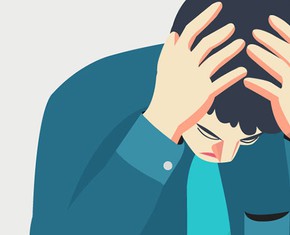The views expressed in our content reflect individual perspectives and do not represent the authoritative views of the Baha'i Faith.
I had a friend in high school, a lively, magnetic girl with flaming red hair, who seemed a little down one day. On the way home from school, I stopped by her house and asked “Are you OK?”
As we stood facing each other through her doorway, she broke down, sobbing. Tears flowed like two rivers over her cheeks. I reached out to her and hugged her, and she cried even more, her whole body wracked with convulsive weeping.
After maybe ten minutes, she showed me a large bottle of aspirin she was holding in one hand. “I was just about to take all of these,” she said. She told me she had made a silent bargain with herself—that if she went through the whole day, and no one asked her how she was doing, she was going to commit suicide.
It turned out that her boyfriend had broken up with her the day before, and her father, on the same night, announced that he and her mother were getting a divorce. My friend felt that her life was over, and that she would never be happy again. She made up her mind to end her life, unless someone intervened. Luckily, without knowing it, I had cluelessly stumbled into her plans.
We sat down in her living room and talked. I hadn’t yet become a Baha’i, but I told her that the Baha’i teachings, like the teachings of all the major Faiths, prohibit suicide. They regard life as a gift from the Creator:
God has created man lofty and noble, made him a dominant factor in creation. He has specialized man with supreme bestowals, conferred upon him mind, perception, memory, abstraction and the powers of the senses. These gifts of God to man were intended to make him the manifestation of divine virtues, a radiant light in the world of creation, a source of life and the agency of constructiveness in the infinite fields of existence. Shall we now destroy this great edifice and its very foundation, overthrow this temple of God, the body social or politic? – Abdu’l-Baha, The Promulgation of Universal Peace, p. 352.
Around the world, almost a million people commit suicide every year—and that doesn’t count the drug or alcohol overdoses we often label as “accidental death” but were really intentional. Imagine, if you will, what those departed souls could have given to humanity and to the world if they had decided to live. Imagine the permanent damage their deaths do to their loved ones. Imagine, too, what might have happened if they had decided to patiently get through their tests and trials, to recognize that the vagaries of life mean that our troubles eventually pass:
You must not injure yourselves or commit suicide. … It is not permissible … Should anyone at any time encounter hard and perplexing times, he must say to himself, ’This will soon pass.’ – Abdu’l-Baha, Star of the West, Volume 7, p. 280.
My friend, who was 15 at the time, did not end her life. She grew up to become a happily-married mother of three wonderful children, who are now adults and have their own children. She also became a successful artist, whose beautiful paintings have enriched millions of lives.
However—the Baha’i teachings do not condemn or castigate those who end their own lives. While the Baha’i laws prohibit suicide, Baha’is understand that some people simply cannot face another moment in this difficult plane of our existence. The Baha’i teachings actually view suicide as sad and deplorable—but they also recognize the underlying impetus as one that all people face, and view it with mercy and compassion. That kind understanding, exemplified in this letter from Abdu’l-Baha to a woman whose husband took his own life, assures us all that the conditions of grave depression, anguish and sadness that lead to suicide will be alleviated in the next world:
O thou seeker of the Kingdom! Thy letter was received. Thou hast written of the severe calamity that hath befallen thee—the death of thy respected husband. That honourable man hath been so subjected to the stress and strain of this world that his greatest wish was for deliverance from it. Such is this mortal abode: a storehouse of afflictions and suffering. It is ignorance that binds man to it, for no comfort can be secured by any soul in this world, from monarch down to the most humble commoner. If once this life should offer a man a sweet cup, a hundred bitter ones will follow; such is the condition of this world.
The wise man, therefore, doth not attach himself to this mortal life and doth not depend upon it; at some moments, even, he eagerly wisheth for death that he may thereby be freed from these sorrows and afflictions. Thus it is seen that some, under extreme pressure of anguish, have committed suicide.
As to thy husband, rest assured. He will be immersed in the ocean of pardon and forgiveness and will become the recipient of bounty and favour. – Abdu’l-Baha, Selections from the Writings of Abdu’l-Baha, pp. 200-201.
Today, September 10, is World Suicide Prevention Day. The International Association for Suicide Prevention has a whole host of suggestions on their website for helping those who consider suicide. It also describes the cases of many suicidal people who did not want to die, but instead wished that someone would intervene and stop them—who actively hoped for and sought anyone who would sense their despair and ask them whether they were OK.

Sometimes, suicidal people say that they made a pact with themselves—that if someone did ask, they would tell them everything and allow them to intervene, just as my red-haired friend did.
The next time a friend, family member or stranger seems down and depressed, will you ask?
We all know that life is precious and sometimes precarious. Almost everyone thinks that death might be easier than life at some particular moment of great grief, depression or sadness. So taking a minute to reach out to someone and ask them if they’re OK, whether it’s a complete stranger or close family member or friend, can change the course of their life—and yours.
You May Also Like
Comments

















because we die. If we can survive
that realization, we can start to
focus on what good we can do in
the intervening time between now
and then. Abdu'l-Baha's statements
are always wise and realistic; he
never denied the bitterness of
suffering! His commentary on reincarnation said that this life is
not so sweet we'd want to go through it again. One of our main
duties is letting our own trials
soften instead of harden us; too
many take ...the second route. What
if you had? You'd have passed by
her house, and she'd be gone. There is nothing we can do about
mortality, but we can always love!